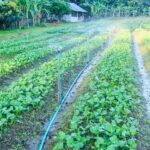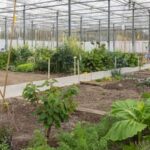Container vegetable gardening has become increasingly popular, especially for those with limited outdoor space. It allows individuals to grow their own fresh produce in small urban areas or on patios and balconies.
When it comes to successful container vegetable gardening, the use of manure can play a crucial role in providing essential nutrients for plant growth and improving soil quality. From choosing the right containers to understanding the importance of manure, this article will guide you through all you need to know about starting your own container vegetable garden with manure.
Container gardening offers a practical solution for cultivating vegetables in areas where traditional ground plots are not available. By using various types of containers such as pots, barrels, or boxes, individuals can create their own thriving garden filled with nutritious produce. However, one key element that is often overlooked in container gardening is the use of manure as a natural fertilizer to promote healthy plant growth and ensure a bountiful harvest.
In this comprehensive guide, we will discuss the best practices for selecting suitable containers, choosing the right vegetables, and understanding the importance of incorporating manure into your container vegetable garden. Additionally, we will explore different types of manure suitable for container gardening and provide step-by-step instructions on how to prepare and apply manure effectively.
Whether you are new to gardening or looking to enhance your existing container garden, this article aims to equip you with the knowledge and tips needed for successful container vegetable gardening with manure.
Choosing the Right Containers for Your Vegetable Garden
When it comes to container vegetable gardening, choosing the right containers is crucial to the success of your garden. The type of containers you use can greatly impact the growth and health of your vegetables. There are a variety of options to choose from, each with its own set of pros and cons.
Types of Containers
One popular option for container vegetable gardening is using traditional clay or ceramic pots. These pots are not only attractive, but they also provide good drainage for your plants. Another option is plastic containers, which are lightweight and easy to move around, making them ideal for small spaces or balconies. Fabric grow bags are also gaining popularity due to their superior aeration and drainage properties.
Size and Depth
Regardless of the material you choose, it’s important to consider the size and depth of your containers. Most vegetables require a container that is at least 12 inches deep to allow for proper root growth. Additionally, make sure the containers have enough width to accommodate the spread of the plant’s roots.
Drainage
Proper drainage is essential for container vegetable gardening. Ensure that your containers have adequate drainage holes at the bottom to prevent waterlogging, which can lead to root rot. If your chosen container does not already have drainage holes, consider drilling them yourself before planting.
By carefully considering the type, size, depth, and drainage of your containers, you can set your container vegetable garden up for success. Properly selected containers will provide a healthy environment for your plants while optimizing space and resources available in your home or outdoor space. And don’t forget – if you’re using manure in your container vegetable gardening, be cautious about the potential stains or damage it could cause to certain types of containers.
Selecting the Best Vegetables for Container Gardening
Container vegetable gardening can be a convenient and rewarding way to grow your own fresh produce, even if you have limited space. When it comes to selecting the best vegetables for container gardening, there are a few things to consider. Firstly, it’s important to choose vegetables that are well-suited to growing in containers. This includes smaller varieties of popular vegetables such as tomatoes, peppers, lettuce, and beans.
Another factor to consider when selecting vegetables for container gardening is the amount of space they require to grow. Some vegetables, like carrots and radishes, have smaller root systems and can thrive in containers with relatively shallow soil. On the other hand, larger vegetables like zucchini and cucumbers may require larger containers with more depth for their roots to spread out.
It’s also worth considering the yield of the vegetables you choose to grow in your container garden. If you have limited space but still want a bountiful harvest, consider choosing high-yielding varieties of vegetables that are well-suited to container gardening. Additionally, some vegetables like herbs and salad greens can be grown in smaller pots or even window boxes, making them perfect for those with very limited space.
When selecting the best vegetables for your container garden, keep in mind that regular feeding is essential for healthy plant growth. Using organic materials such as manure can greatly benefit your container vegetable garden by providing essential nutrients to your plants. Choosing the right types of manure suitable for container vegetable gardening is crucial in ensuring optimal growth and reducing common mistakes along the way.
Understanding the Importance of Manure in Vegetable Gardening
Manure is a highly valuable and beneficial component in vegetable gardening, especially in the context of container gardening. It provides essential nutrients to the soil, improves its structure, and promotes strong, healthy plant growth. Manure is rich in nitrogen, phosphorus, potassium, and other trace minerals that are essential for the development of vegetables. In container gardening where space is limited, the use of manure becomes even more crucial as it helps maximize productivity in a confined environment.
In addition to its nutrient content, manure also enhances the water retention capacity of the soil. This is particularly important in container gardening where soil tends to dry out more quickly compared to traditional ground-based gardens. The organic matter present in manure acts as a sponge, holding moisture around the roots of the plants and ensuring they have a constant water supply. This can be beneficial during hot summer months or in climates with irregular rainfall.
When it comes to container vegetable gardening, using manure can be a game-changer. It’s important to note that not all types of manure are suitable for this purpose.
Understanding the different types of manure and how to prepare and apply them properly to your container garden is critical for success. In the following sections, we will delve into these aspects in detail and provide valuable insights on how to harness the power of manure for a thriving container vegetable garden.
| Benefit | Explanation |
|---|---|
| Nutrient-rich | Manure is rich in nitrogen, phosphorus, potassium, and other minerals necessary for plant growth. |
| Improved water retention | The organic matter in manure helps soil retain moisture, which is particularly useful in container gardening. |
Types of Manure Suitable for Container Vegetable Gardening
When it comes to container vegetable gardening, choosing the right type of manure is essential for the health and success of your plants. Manure provides valuable nutrients to the soil, improves its structure, and promotes healthy growth in vegetables. However, not all types of manure are suitable for container gardening. It’s important to understand the different options available and select the best type for your specific needs.
Organic vs. Inorganic Manure
Organic manure, such as composted animal waste or green manure, is the most popular choice for container vegetable gardening. It is rich in essential nutrients, improves soil fertility, and promotes beneficial microbial activity. In contrast, inorganic manure is chemically created and may contain harmful substances that can be detrimental to plant health. When choosing manure for your container garden, always opt for organic varieties to ensure the best results.
Popular Types of Manure
Some of the most popular types of manure suitable for container vegetable gardening include cow manure, chicken manure, horse manure, and composted sheep/goat manure. These varieties are readily available at garden centers and are known for their high nutrient content and ability to enhance soil structure. Cow manure is particularly favored for its balanced mix of nitrogen, phosphorus, and potassium – three key elements necessary for healthy plant growth.
Considerations for Use
Before applying any type of manure to your container garden, it’s crucial to consider the age and condition of the manure. Fresh manures can burn delicate plant roots due to their high ammonia content.
Therefore, always ensure that any fresh animal waste has been composted properly before use in your vegetable containers. Additionally, be mindful of potential odor issues that may arise from certain types of manures when used in a confined space such as a balcony or patio garden.
By carefully selecting the right type of manure for your container vegetable garden and following proper application techniques, you can significantly enhance the health and productivity of your plants while fostering a more sustainable approach to gardening. Utilizing organic options will not only benefit your immediate growing environment but also contribute positively to wider ecological systems by reducing reliance on chemical fertilizers.
How to Prepare and Apply Manure to Your Container Garden
When it comes to preparing and applying manure to your container vegetable garden, there are several important factors to consider. Manure is a valuable source of nutrients for your plants, but it must be used correctly to avoid any negative effects on the garden. Here are some steps to prepare and apply manure effectively:
- Choose the right type of manure: Not all manure is created equal when it comes to container vegetable gardening. Look for well-aged manure from herbivores such as cows, horses, or chickens. Avoid using fresh manure, as it can contain high levels of ammonia that can burn your plants.
- Prepare the manure: Before applying the manure to your container garden, it’s important to let it age properly. This process helps kill any harmful pathogens and allows the nutrients to stabilize. You can do this by composting the manure for at least six months before using it in your garden.
- Apply the manure: Once the manure is prepared, you can incorporate it into your container soil mix. Use a ratio of one part aged manure to three parts potting soil. Mix it thoroughly to ensure an even distribution of nutrients throughout the soil.
Properly preparing and applying manure to your container garden can provide your vegetables with essential nutrients for healthy growth. However, it’s crucial to follow these steps carefully and avoid common mistakes that could harm your plants.
- Avoid overuse: While manure is beneficial, using too much can lead to nutrient imbalances and harm your plants. Stick to the recommended ratios and avoid excessive applications.
- Monitor soil pH: Manure can affect the pH of your soil, so regular testing is essential. Adjustments may be necessary to maintain an optimal growing environment for your vegetables.
- Watch for signs of stress: Keep an eye on your plants for any signs of distress after applying manure. Symptoms like wilting, yellowing leaves, or stunted growth could indicate issues with the manure application.
By following these tips, you can effectively prepare and apply manure to promote a healthy and thriving container vegetable garden.
Tips for Maintaining a Healthy Container Vegetable Garden With Manure
Maintaining a healthy container vegetable garden with manure requires proper care and attention to ensure that your plants thrive. One of the most critical factors in this process is choosing the right type of manure for your container garden. Organic manure such as compost or well-rotted animal manure is ideal for container vegetable gardening, as it provides essential nutrients to the plants while improving soil structure and drainage.
When applying manure to your container garden, it’s vital to follow specific guidelines to prevent burning the plants or introducing harmful pathogens. It’s recommended to mix the manure with potting mix or topsoil before adding it to your containers. This allows for better distribution of nutrients and reduces the risk of over-fertilization. Additionally, avoid using fresh manure, as it can contain high levels of ammonia and nitrogen that can be damaging to plant roots.
In addition to choosing the right manure and applying it correctly, regular maintenance is crucial for keeping your container vegetable garden healthy. This includes watering your plants consistently, monitoring for pests and diseases, and providing adequate sunlight. By following these tips, you can ensure that your container vegetable garden thrives with the help of manure.
| Manure Type | Benefits |
|---|---|
| Compost | Provides essential nutrients and improves soil structure |
| Well-rotted animal manure | Offers vital nutrients while enhancing soil drainage |
Common Mistakes to Avoid in Container Vegetable Gardening With Manure
When it comes to container vegetable gardening with manure, there are several common mistakes that gardeners should avoid in order to ensure the health and success of their plants. Here are some key points to keep in mind:
1. Overuse of Manure: While manure is a beneficial source of nutrients for plants, using too much can actually harm them. Excessive amounts of manure can lead to an imbalance of nutrients in the soil, as well as an unpleasant odor. It’s important to follow recommended guidelines for the amount of manure to use based on the size of your containers and the specific needs of your chosen vegetables.
2. Not Allowing Proper Decomposition: Manure should be properly aged and decomposed before being used in container vegetable gardening. Fresh manure can contain high levels of ammonia and pathogens, which can be harmful to plants and even pose health risks to gardeners. Make sure that any manure you use has been composted or aged for several months before applying it to your containers.
3. Ignoring pH Levels: Different types of manure can have varying effects on the pH levels of the soil. For example, chicken manure tends to be more acidic, while cow or horse manure is more neutral. It’s essential to monitor and adjust the pH levels in your container garden so that they are optimal for the vegetables you are growing. Consider conducting a soil test and adding amendments as needed to maintain a healthy pH balance.
By avoiding these common mistakes, you can effectively harness the benefits of using manure in your container vegetable gardening endeavors. With proper care and attention, your plants will thrive and provide a bountiful harvest for you to enjoy.
Conclusion and Final Thoughts on the Benefits of Using Manure in Container Vegetable Gardening
In conclusion, container vegetable gardening can be a convenient and effective way to grow your own produce, even if you have limited space. Choosing the right containers and selecting the best vegetables are important steps to ensure the success of your garden. Understanding the importance of manure in vegetable gardening is also crucial, as it provides essential nutrients for healthy plant growth.
When it comes to using manure in container vegetable gardening, it’s important to select the right type of manure that is suitable for this purpose. Whether you choose composted manure or concentrated manure, be sure to prepare and apply it properly to ensure that your plants receive the nutrients they need without any risk of burning them with excessive fertilizer.
Maintaining a healthy container vegetable garden with the use of manure involves regular monitoring of soil moisture, proper watering, and preventing common mistakes such as over-fertilizing or using low-quality manure. By following these tips and best practices, you can enjoy a bountiful harvest from your container vegetable garden while reaping the benefits of using manure to nourish your plants.
With proper care and attention, you can experience the joy of growing your own vegetables even in a small urban space.
Frequently Asked Questions
Which Manure Is Best for Potted Plants?
The best manure for potted plants is well-aged compost or composted cow, horse, or poultry manure. These types of manure provide essential nutrients for the plants without the risk of burning their roots.
What Is the Best Fertilizer for Potted Vegetables?
The best fertilizer for potted vegetables is a balanced, water-soluble fertilizer with equal parts nitrogen, phosphorus, and potassium. Look for a fertilizer specifically formulated for vegetables to ensure they get the proper nutrients they need.
How Often Should I Fertilize My Container Vegetable Garden?
You should fertilize your container vegetable garden every 4-6 weeks during the growing season. It’s important not to over-fertilize, as this can harm the plants. Always follow the instructions on the fertilizer package and adjust based on your plant’s needs.

If you’re looking to get into vegetable gardening, or are just looking for some tips on how to make your current garden better, then you’ve come to the right place! My name is Ethel and I have been gardening for years. In this blog, I’m going to share with you some of my best tips on how to create a successful vegetable garden.





